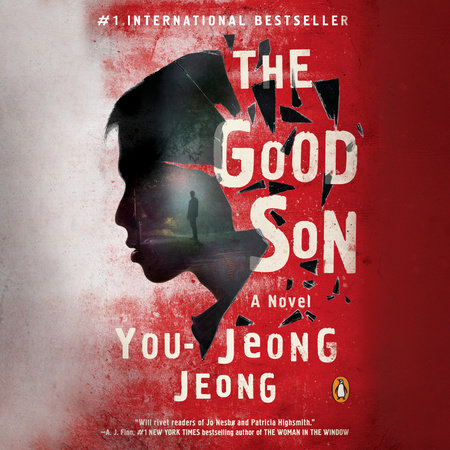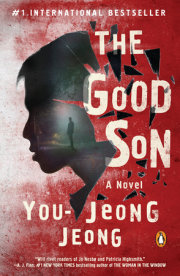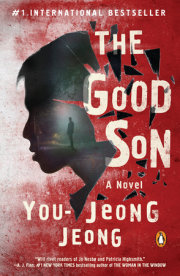The smell of blood woke me. It was intense, as though my whole body were inhaling it. It reverberated and expanded within me. Strange scenes flitted through my mind—the fuzzy yellow light of a row of street lamps in the fog, swirling water below my feet, a crimson umbrella rolling along a rain-soaked road, a plastic tarpaulin shrouding a construction site snapping in the wind. Somewhere a man was singing and slurring lyrics: a song about a girl he couldn’t forget, and about her walking in the rain.
It didn’t take me long to figure out what was going on. None of this was reality or even the remnants of a dream. It was a signal my head was sending my body. Stay lying down. Don’t move. It’s the price you have to pay for not taking your medication.
Not taking my meds was a quenching rain in the desert of my life, even if it sometimes caused a seizure. Right now, I was experiencing the unsettling hallucinations that warned me a storm was imminent. There was no safe harbor; I could only wait for it to arrive. If past experience was any indication, when it was over, I wouldn’t remember what had happened. It would be simple and intense, and afterward I would be tired and depleted. I deserved this; I knew full well what I was getting into when I chose this path. It was an addiction; I kept doing it again and again despite understanding the risks. Most addicts get high to chase after a fantasy, but for me it was a different route: I had to get
off my drugs to reach a heightened reality. That was when the magic hours opened up—my headaches and tinnitus disappeared, and my senses became acute. I could smell like a dog, my brain whirred quicker than ever, and I read the world by instinct instead of with reason. I felt empowered and superior.
Even then, I still had tiny dissatisfactions. I never felt superior to Mother and Auntie. These two women treated me like a seat cushion—something to be suffocated and smothered. I knew what the chain of events would be if Mother were to witness me having a seizure. As soon as I recovered, she would drag me straight to Auntie, the famous psychiatrist and director of Future Pediatric Clinic. Auntie would look into my eyes and talk to me kindly to try to get me to listen to her.
Why did you stop taking your pills? Tell me honestly, so I can help you. Frankly, though, honesty is neither my strong suit nor something I aspire to. I prefer to be practical, so my answer would be:
I forgot to take it one day, then the next day I forgot that I’d forgotten the day before, and while I’m at it, why don’t I just say that I’ve forgotten about it every day until this very moment? Auntie would declare that I was falling into another dangerous pattern, and Mother would order me to take the pills at each meal under observation. They would drill into me the steep price I would pay for a few thrilling days, making it clear that as long as I continued to behave this way, I would never be free of their gaze.
“Yu-jin.” Suddenly Mother’s voice popped into my head. I had heard it, soft but clear, right before I woke up. But now I couldn’t even hear her moving about downstairs. It was so quiet. A deafening stillness. It was dark in my room; maybe it was still early, before the sun was up. She might still be asleep. Then I could have this seizure and be done with it without her having to know about it, like last night. Around midnight, I’d stood panting near the sea wall on my way back from a run to the Milky Way Observatory in Gundo Marine Park. I ran when I got restless and felt my muscles twitching with energy. I thought of it as “restless body syndrome.” Sometimes I ran in the middle of the night; it wouldn’t be exaggerating to call it a mad urge.
The streets were deserted, as they always were at that hour. Yongi’s, the street stall that sold sugar-filled pancakes, was closed. The ferry dock below was shrouded in darkness. Thick fog had swallowed the six-lane road by the sea wall. The December wind was biting and powerful, and a torrential rain was falling. Most would consider these adverse conditions, but I felt as though I was floating in the air. I felt fantastic. I could float all the way home. It would have been perfect if it hadn’t been for the sweet smell of blood perfuming the wind, suggesting an impending seizure. A girl got off the last bus to Ansan and tottered toward me with her umbrella held open, pushed along by the wind. I had to get home; I didn’t want to crumple to the ground and roll around, contorted like a squid thrown on the grill, in front of a complete stranger.
I couldn’t remember what happened after that. I must have lain down as soon as I walked into my room, without bothering to change. I probably fell asleep snoring. It had been the third seizure I’d had in my life, but this was the first time I’d sensed another one coming so quickly after the last. And this smell was a different beast altogether: my skin was stinging, my nose was tingling and my mind was foggy. The episode that was about to come felt like it could be the most intense one yet.
Copyright © 2018 by You-Jeong Jeong. All rights reserved. No part of this excerpt may be reproduced or reprinted without permission in writing from the publisher.













